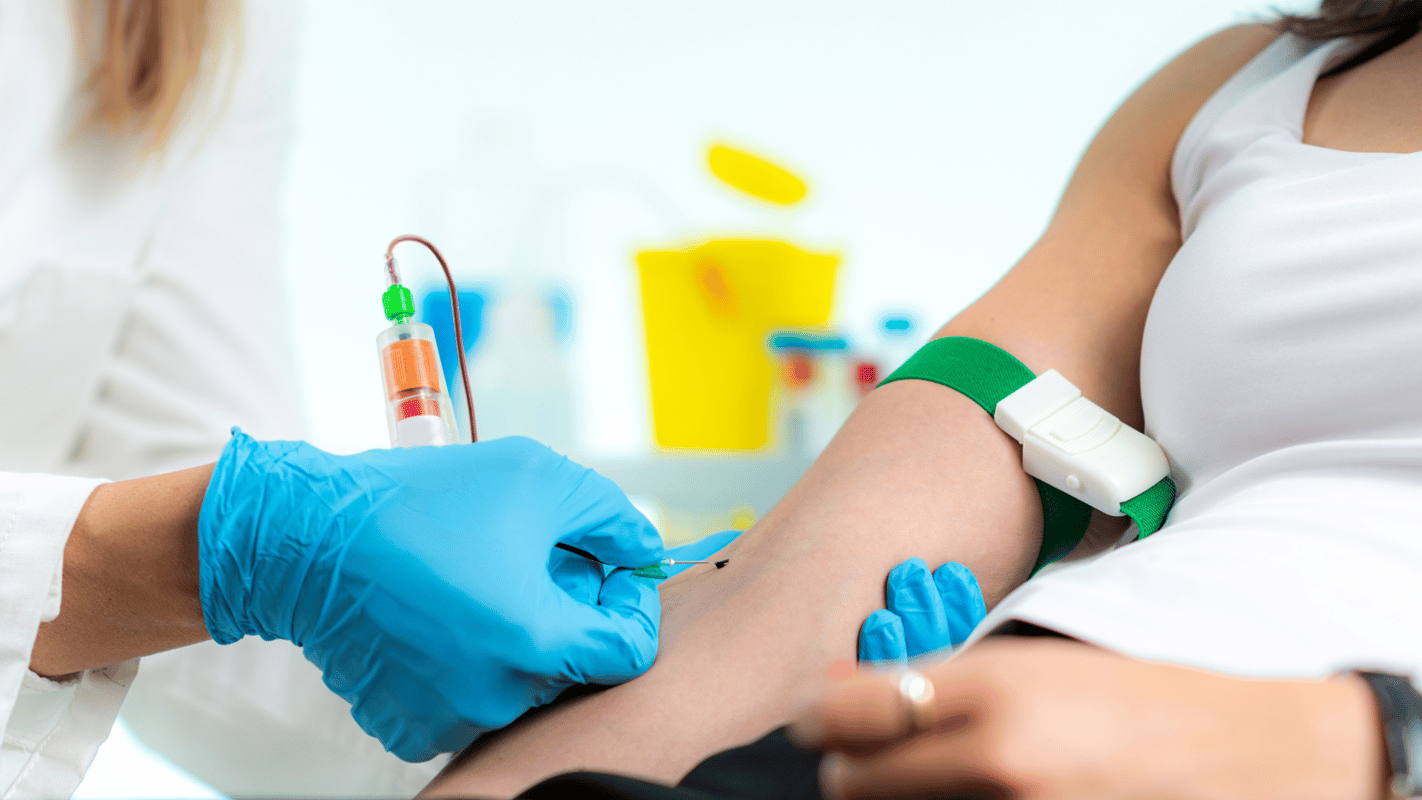What is Phlebotomy?
Phlebotomists are healthcare professionals responsible for drawing blood from patients for various medical tests, blood donations, or other procedures. Their primary duties include collecting blood samples, labeling them accurately, and ensuring the safety and comfort of patients during the process.
Where does a Phlebotomist work?
Phlebotomists play a vital role in healthcare by drawing blood for various purposes. They work in diverse settings, each with specific responsibilities. Here’s where you might find a phlebotomist:
- Hospitals: In hospitals, phlebotomists collect blood samples for diagnostic tests and ensure they are properly processed and transported to labs for analysis.
- Clinics: At clinics, phlebotomists perform blood draws for routine check-ups, diagnostic purposes, and ongoing monitoring of chronic conditions.
- Medical Laboratories: Phlebotomists in laboratories focus on drawing blood and ensuring accurate handling and labeling of samples for various medical tests.
- Blood Donation Centers: At blood donation centers, phlebotomists collect blood from donors, manage the donation process, and ensure donor safety and comfort.
- Physician’s Offices: In physician’s offices, phlebotomists handle blood collection for tests ordered by doctors and may assist with other clinical tasks as needed.
How to Become a Phlebotomist in Alabama? What are the requirements to become a Phlebotomist in Alabama?
Becoming a phlebotomist in Alabama can be an easy journey, especially if you know what to do and what to have beforehand! Here’s our simple yet informative guide to help you reach your career goals as a phlebotomist:
1. Finish high school or get a GED: Complete your high school education or obtain an equivalent degree like a GED. This is essential for enrolling in phlebotomy training and being eligible for the national certification exam.
2. Join a phlebotomy training program: Enroll in a training program accredited by agencies like the National Accrediting Agency for Clinical Laboratory Sciences (NAACLS) or the Accrediting Bureau of Health Education Schools (ABHES). These programs typically last 4 weeks or more, costing around $780 and above. They include both classroom learning and hands-on training in a clinic and you'll spend about 120 hours in class and practical experience, studying the human body, basic patient customer service skills, how to control infection, and how to draw blood. You'll also get to practice these skills under the supervision of an experienced phlebotomist.
3. Be the right age: Most training programs and employers require you to be at least 18 years old. Some programs may accept individuals as young as 16 or 17.
4. Pass a background check and drug test: A background check and drug test are often required to ensure patient safety. Many training programs and employers will require these as part of their enrollment or hiring process.
5. Show your immunizations and CPR certification: You may need to provide proof of immunizations and CPR certification before starting your training. Some programs might also require a physical exam and health check.
6. Get your license or certification: While Alabama does not require a license for phlebotomists, most employers prefer certified professionals. After completing your training, you'll receive a certificate of completion. To obtain national certification, you’ll need to pass a certification exam, which is important for new phlebotomists without prior experience.
Where can I find Phlebotomy classes in Alabama?
Want top-notch blood-draw training in Alabama? Dreambound is your go-to spot for job-centric training! We have a range of phlebotomy classes near you, setting you up for a thriving career.
Selecting the right course is a breeze with Dreambound's straightforward system. Browse through various courses and choose a blood-draw class close to you. Plus, meet Skipper, your AI coach, always on hand to direct you towards the right job. Drop by Dreambound today and kick-start your future!
How do I get my Phlebotomy certification in Alabama?
Are you ready to secure your future as a certified phlebotomist? Here's a clear and straightforward guide on how to get there:
1. Choose your certification body: Decide which organization you want to get certified through. Popular choices include the American Society for Clinical Pathology (ASCP), National Center for Competency Testing (NCCT), American Certification Agency (ACA), National Healthcareer Association (NHA), American Society of Phlebotomy Technicians (ASPT), American Medical Technologist (AMT), and National Phlebotomy Association (NPA). Check with your training school for recommendations if needed.
2. Understand the certification requirements: Each certifying body has different eligibility criteria. These may include minimum education levels, required training hours, and successful completion of practical tasks like blood draws. Additionally, certification fees, exam content, and rescheduling policies vary. Make sure to review these details on the certifying body's website or information packets.
3. Prepare for the exam: Once you have chosen your certifying body, prepare for the exam by utilizing online resources, practice tests, and study guides. Many certifying agencies offer these materials to help you succeed.
4. Sit for the exam: The certification exam will typically be computer-based or in-person and will be timed. You will usually have 2 hours or more to complete a multiple-choice test.
5. Celebrate your achievement: After passing the exam, you'll receive your certification and be listed on the national registry. You will also get a digital copy of your certification to print and use. This certification will boost your credentials and help you start your career as a certified phlebotomist.
Remember, each certifying organization has unique requirements, so be sure to research and select the one that best fits your needs. Choose wisely, prepare thoroughly, and you’ll be on your way to a rewarding career as a certified phlebotomist.
How do I get a job as a Phlebotomist?
Ready to start your career as a phlebotomist? With your certification in hand, you’re well on your way to landing a rewarding job. Follow these steps to make the most of your new credentials and find the perfect role:
1. Network with professionals: Connect with others in the healthcare field to learn about job openings and gain insights into the industry. Attend networking events, join professional organizations, and engage with online communities related to phlebotomy.
2. Gain hands-on experience: Look for internships or volunteer opportunities to gain practical experience. This will not only build your skills but also enhance your resume and make you more attractive to potential employers.
3. Utilize job search platforms: Explore job search websites and platforms to find available phlebotomist positions. Various websites are great resources for finding job listings and applying for roles that match your skills and interests.
4. Prepare your resume and cover letter: Tailor your resume and cover letter to highlight your phlebotomy certification, relevant skills, and hands-on experience. Make sure they reflect your qualifications and enthusiasm for the role.
5. Apply for jobs: Submit your applications to various job openings, and be prepared for interviews. Practice common interview questions and be ready to discuss your training, experience, and passion for phlebotomy.
6. Maintain your certification: Keep your certification up-to-date to ensure your credentials remain valid. Generally, phlebotomy certifications are valid for 1-3 years, and renewal is often straightforward. You can usually renew by earning continuing education credits. Stay informed about expiration dates, renewal costs, and requirements through your certification agency. For more details, check out how to renew your phlebotomy certificate.
Career Paths and Opportunities after Becoming a Phlebotomist
With a phlebotomy certification, you can explore various career paths, such as working in a hospital, clinic, or diagnostic laboratory. Some phlebotomists may also choose to advance their careers by pursuing additional training or specializations, such as becoming a medical assistant or a nursing assistant.
Other phlebotomists further education, too! Being a phlebotomist opens a lot of doors and comparing it to other roles is a way to see other possible careers on the horizon. If this is something that appeals to you, here are some helpful guides that you can check out!
Frequently Asked Questions







